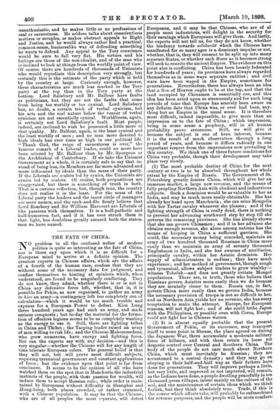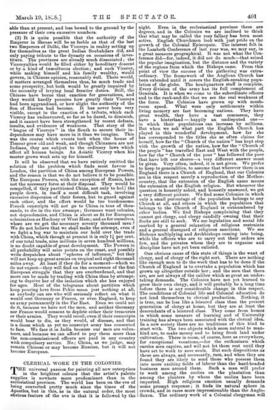THE FATE OF CHINA.
NO problem in all the confused welter of modern politics is quite so interesting as the fate of China, nor is there any upon which it is so difficult for a European mind to arrive at a definite opinion. The greatest experts in Chinese affairs, which are the affairs of a fourth of the human race, confess that they are without some of the necessary data for judgment, and confine themselves to hinting at opinions which, when understood, are found to be singularly conflicting. They do not know, they admit, whether there is or is not in China any defensive force left, whether, that is, it is possible for Pekin, as now organised, to gather an army or hire an army—a contingency left too completely out of calculation—which it would be too much trouble and expense for a European Power to defeat. Kien Lung three hundred years ago had such an army, and made serious conquests ; but to-day the material for the forma- tion of effective legions seems to be as completely wanting as the energy to use it. Still, there are fighting tribes in China and Thibet the Taeping leader raised an army of men willing to risk life ' • and the Chinese Mahommedans, who grow numerous, have energy and fighting force. Nor can the experts say with any decision—and this is very singular—whether the Chinese will for any length of time tolerate European rulers. The general belief is that they will not, but will prove most difficult subjects, requiring tyrannical government and constant applications of force ; but the evidence upon that point is far from conclusive. It seems to be the opinion of all who have watched them on the spot that in Manchuria the industrial instincts of the people, with their passion for wealth, will induce them to accept Russian rule ; while order is main- tained by Europeans without difficulty in Shanghai and Hong-kong, both places crowded, or rather crammed, with a Chinese population. It may be that the Chinese, who are of all peoples the most vparate, will detest Europeans, and it may be that Chinese, who are of al people most industrious, will delight in the security for their earnings which Europeans will give them. And lastly, the experts will not tell us, for they do not know, whether the tendency towards solidarite which the Chinese have manifested for so many ages is a dominant impulse or not, whether, that is, they will consent to be split up into many separate States, or whether each State as it becomes strong will seek to reunite the ancient Empire. The evidence on this point also is conflicting. China has been loosely federated for hundreds of years ; its provinces have always regarded themselves as in some ways separate entities ; and civil wars have been waged in the Empire, sometimes for generations. Nevertheless, there has always been an idea that a Son of Heaven ought to be at the top, and that the land occupied by Chinamen is essentially one, and this idea has been acted upon so strenuously and for such long periods of time that Europe has scarcely been aware on any definite date that China was, or ever had been, any- thing but an Empire in the usual sense. It is therefore most difficult, indeed impossible, to give more than an impression as to the fate of China ; which impression, being in some sense a prophecy, will in all human probability prove erroneous. Still, we will give it because the subject is one of keen interest, because it is the result of much observation through a long period of years, and because it differs radically in one important respect from the impressions now prevailing in this country. We think one of three future conditions for China very probable, though their development may take place very slowly.
(1) The most probable destiny of China for the next century or two is to be absorbed throughout her whole extent by the Empire of Russia. The Government of St. Petersburg greatly desires China, which will give her an immense market, a large new revenue, and the means of fully peopling Northern Asia with obedient and industrious subjects. Such a dominion would be as valuable to her as India, and may be much more easily obtainable. She has already her hand upon Manchuria ; she can seize Mongolia with her Tartar cavalry whenever she pleases ; and if the fighting strength of China is really dead, there is nothing to prevent her advancing southward step by step till she governs the remaining provinces. She has already shown that she can govern Chinamen ; and if in her advance she obtains enough revenue, she alone among nations has the means of keeping in China a sufficient garrison. She could, the necessary money being conceded, maintain an army of two hundred thousand Russians in China more easily than we maintain an army of seventy thousand Englishmen in India, and she has swarms of auxiliaries, principally cavalry, within her Asiatic dominion. Her supply of administrators is endless ; they have much experience ; and her method of government, though rough and tyrannical, allows subject traders to grow wealthy— witness Tobolsk—and does not greatly irritate Mongol populations. There are, in truth, those who believe that Russians govern Asiatics more easily than we do because they are mentally closer to them. Russia can, in fact, govern China more easily than we govern India, because the necessary provision of troops is not so difficult to her, and as Northern Asia yields her no revenue, she has every temptation to make the attempt. Europe, for European reasons, will not fight her ; and if she could bribe Japan with the Philippines, or possibly even with Corea„ Europe could not fight her in Chinese waters.
(2) It is almost equally probable that the present Government of Pekin, or its successor, may transport itself to some point in Shense, the place agreed on during the Japanese War, there accumulate a moderate military force of hillmen, and with them retain its loose yet despotic control over Central and Southern China. The body of the people do not care much about Northern China, which must inevitably be Russian; they are accustomed to a central dynasty ; and they may go on obeying in their half-and-half way as their fathers have done for generations. They will improve perhaps a little, but very little, and improved or not improved, will remain, as the Indians have done, a people dwelling peacefully in tee thousand green villages, intent mainly on the culture of the soil, and the maintenance of certain ideas which we think foolish, but they think absolutely true. Trade, if this is the course which affairs take, will probably be enfranchised for revenue purposes, and the people will be more comfort- able than at present, and less bowed to the ground by the pressure of their own excessive numbers.
(3) It is quite possible that the authority of the Emperor in Shense will be as feeble as that of the last two Emperors of Delhi, the Viceroys in reality setting up for themselves as the great Indian Soubahdars did, and only paying tribute to the dynasty on occasions of inves- titure. The provinces are already much dissociated ; the Viceroyalties would be filled either by hereditary descent or by a kind of tumultuous election ; and each Viceroy, while making himself and his family wealthy, would govern, in Chinese opinion, reasonably well. There would, if matters arranged themselves thus, be much trade and some prosperity, but both would be greatly impaired by the necessity of levying local frontier duties. Still, the Chinese have borne that exaction for generations, and they would hardly perceive how greatly their Viceroys had been aggrandised, or how slight the authority of the Son of Heaven had become. It has never been very visible, except in the exaction of a tribute, which each Viceroy has endeavoured, so far as he dared, to diminish, and it cannot have been strengthened by recent defeats, insults, and evidences of weakness. That story of the "league of Viceroys" in the South to secure their in- dependence may have more in it than we imagine. This was the course which events took when the house of Timour grew old and weak, and though Chinamen are not Indians, they are subject to the ordinary laws which affect all human beings. An Asiatic Viceroy when his master grows weak sets up for himself.
It will be observed that we have entirely omitted the solution of the problem which finds most favour in London, the partition of China among European Powers, and the reason is that we do not believe it to be possible. The European Powers, with the exception of Russia, have not the necessary force at their disposal. They would be compelled, if they partitioned China, not only to hola the people down, in itself a most difficult task, involving excessive dispersion of their forces, but to guard against each other, and the effort would be too burdensome. French conscripts will not go to China in tens of thou- sands, to die in the rice swamps ; Germans want colonies, not dependencies, and China is about as fit for European colonisation as Hackney or West Ham ; and as for ourselves, where are we get the necessary seventy thousand men ? We do not believe that we shall make the attempt, even if we fight a big war to maintain our hold over the trade with China, which though at present it is only 11 per cent. of our total trade, nine millions in seven hundred millions, is no doubt capable of great development. The Powers in all probability will seize points on the coast, and possibly write despatches about "spheres of influence," but they will not keep up great armies on tropical soil eight thousand miles away. At least if they do for a moment—which we do not expect—they will find on the occurrence of the first European struggle that they are overburdened, and that more can be made by trading with China than by attempt- ing to deprive her of the isolation which she has enjoyed for ages. Most of the telegrams about partition which keep pouring here from Pekin mean just nothing at all, as anybody can see who will seriously reflect on what it would cost Germany or France, or even England, to keep an army permanently in the Far East. Even we could not do it, because we have not the men, and neither Germany nor France would consent to deplete either their treasuries or their armies. They would recoil, even if their conscripts would bear to die, as they would, of disease, and that is a doom which as yet no conscript army has consented to face. We face it in India because our men are volun- teers, and because we can afford to pay them more than the non-commissioned officers are paid in any country with compulsory service. No; China, as we judge, may remain Chinese or may become Russian, but it will not become European.







































 Previous page
Previous page